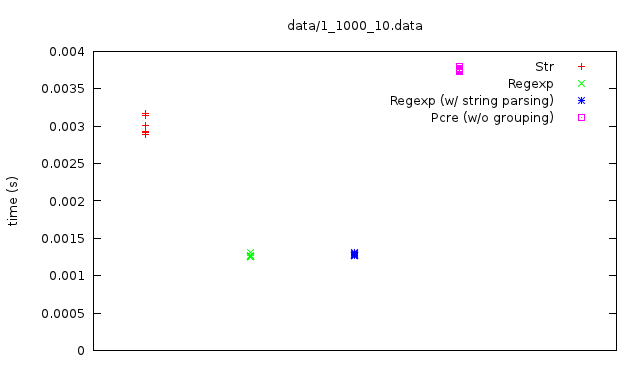Portable Regular Expressions
By Raphael Proust - 2011-08-12
MirageOS targets different backends: micro-kernels for the Xen hypervisor, Unix executables and Javascript programs. The recent inclusion of the Javascript backend makes many C bindings unsuitable. In order to push backend incompatibilities closer to the application level, it is necessary to either reimplement the C bindings in Javascript or OCaml, or remove them completely. This is particularly important for the standard library.
The Str module has to go!
Str provides regular expressions in a non-reentrant, non-functional fashion.
While the OCaml distribution provides it in otherlibs, it is installed by
default and so widely used, and implemented under the hood via a C library.
Regular expressions are used in several places in MirageOS, mainly for small
operations (splitting, getting an offset, etc.), and so having a portable
fallback written in pure OCaml would be very useful.
There are several possible ways to replace the Str module, each with its own
set of perks and drawbacks:
- Use a backend-neutral regexp library which "translates" to either
StrorPcrefor the Xen and Unix backends or Javascript native regexps for the Javascript backend. This solution may be hard to maintain, especially if a fourth backend is to be included. Moreover each regexp library uses a slightly different convention for regexps (e.g. see the magic option in vim) which means that a lot of translation code might be needed. - Do string processing without regexps (using
String.indexand the likes). This solution is portable and potentially efficient. However, the potential efficiency comes from a low-level way of doing things. - Use an OCaml regexp library without C bindings. We expected such a library to
be slower than
Strand needed an estimation of performance cost in order to assess the practicality of the solution.
Benchmarking Str
There is a purely OCaml regexp library readily available, called Regexp and
developed by Claude Marché from the LRI laboratory. You can find the
documentation and the source on the associated
webpage. After getting rid of mutexes
(which, in MirageOS, are of no use, because of the Lwt based
concurrency), we benchmarked it against Str. We also included the popular
Pcre (Perl Compatible Regular Expression) library that is widely used.
The benchmark (available on github) is really simple and measures three different factors:
- regexp construction: the transformation of a string (or another representation available to the programmer) into the internal representation of regexps used by the library
- regexp usage: the execution of operations using regexps
- string size: the length of the string being matched
MirageOS uses regexp in a specific pattern: a limited number of regexp constructions with a potentially high number of invocation (e.g. HTTP header parsing). The size of the strings on which regexps are used may vary. Because of this pattern, our benchmark does not take regexp construction overhead into account.
Here are the execution times of approximately 35000 string matching operations on strings of 20 to 60 bytes long.

Quite surprisingly for the string matching operation, the C based Str module
is less efficient than the pure OCaml Regexp. The Pcre results were even worse
than Str. Why?
A simple library for a simple task
The Regexp library is lightweight, and so far faster than its C based
counterparts. One of the features Regexp lacks is "group capture": the ability
to refer to blocks of a previously matched string. In Pcre it is possible to
explicitly and selectively turn group capturing off via special syntax,
instead of the regular parentheses. Str does not offer this, and thus
imposes the runtime cost of capture even when not necessary. In other words, the
slowdown/group capturing "is not a feature, it's a bug!"
The MirageOS Regexp library
With the introduction of Regexp into the tree, the libraries available to MirageOS
applications are now Str-free and safer to use across multiple backends. The main
drawback is a slight increase in verbosity of some parts of the code.
Benchmarking the substitution operation is also necessary to assess the
performance gain/loss (which we will do shortly).
In addition to cosmetic and speed considerations, it is important to consider the portability increase: MirageOS's standard library is Node.js compatible, a feature we will explore shortly!